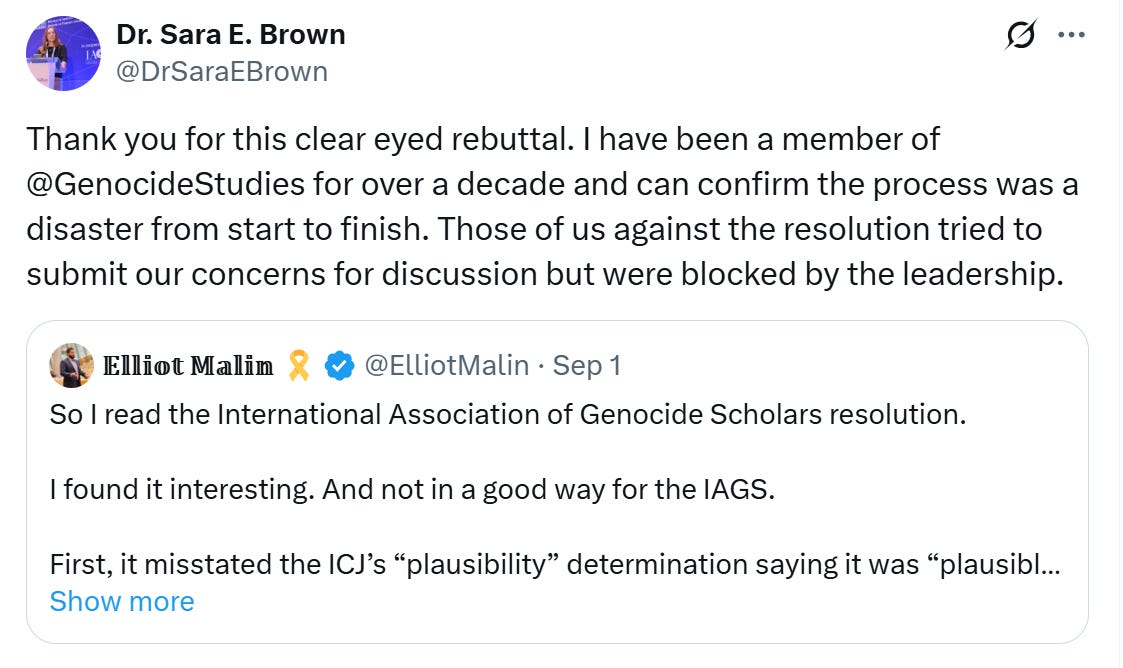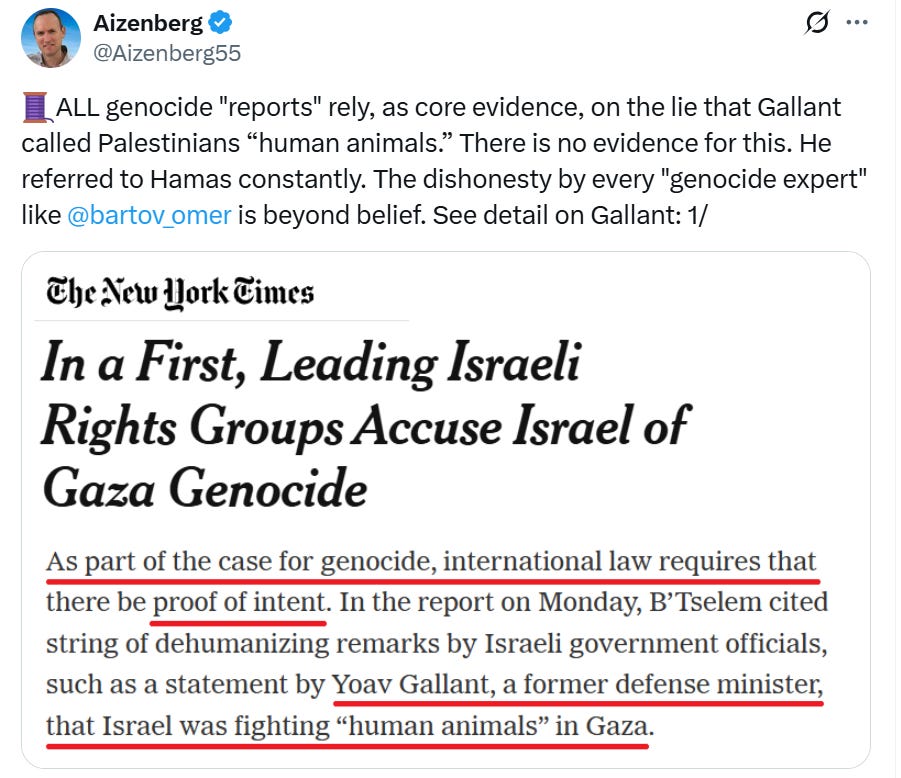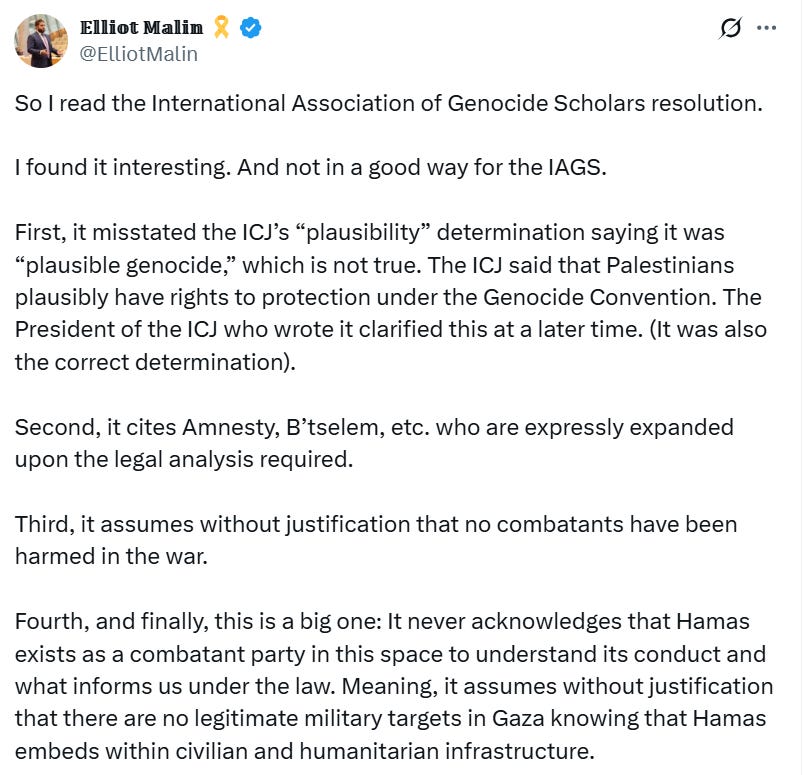Genocide Scholars' Gaza Resolution Based on Flawed Research, Biased Data, Procedural Violations
Dr. Sara E. Brown, a longtime member of the International Association of Genocide Scholars, stated that the process "was a disaster from start to finish"
The International Association of Genocide Scholars (IAGS) passed a resolution on August 31, 2025, claiming that Israel's military actions in Gaza meet the legal definition of genocide under international law, sparking fierce pushback over the organization's methodology and supposed evidence underlying the claims. Israel's Foreign Ministry condemned the declaration, while experts from a range of fields have raised serious questions about the association's processes and the factual basis for key allegations.
Critics Challenge IAGS Methodology and Flaws
The IAGS resolution has faced significant criticism from scholars across different expert fields and within the genocide studies community itself. Dr. Sara E. Brown, a genocide scholar and longtime IAGS member who previously served on the association's advisory board for eight years, challenged the resolution's reliance on “deeply biased, questionable sources” and accused the organization's leadership of pushing through the resolution without following standard procedures for controversial measures.
She noted that the association typically holds virtual town hall discussions for controversial resolutions to allow member debate, but the leadership declined to hold such a discussion for the Israel resolution despite initially promising to do so.

Inaccurate Quotes Attributed to Israeli Leaders
A key criticism centers on the issue of intent, which is fundamental to any genocide determination. The IAGS heavily relies on statements from Israeli leaders that are inaccurate.
For example, in his rebuttal, Honest Reporting board member Salo Aizenberg exposed that the IAGS resolution relies on false evidence. The resolution claims former Israeli Defense Minister Yoav Gallant called Palestinians "human animals," but this frequently-cited quote supporting genocide allegations is completely baseless.
According to multiple news reports from October 2023, Gallant did use the phrase "human animals" when announcing a "complete siege" of Gaza on October 9, 2023, stating "We are fighting human animals and we will act accordingly." This statement was reported by major news outlets including Al Jazeera, NPR, and PBS.
However, Aizenberg points out that this statement did not specifically mention Palestinians and was rather directed toward Hamas. He notes that Gallant's subsequent statements consistently focused on defeating Hamas as a terrorist organization.
He contends that genocide allegations rely on a mischaracterization of Gallant's intent, pointing to numerous other statements where the Defense Minister specifically referenced fighting Hamas rather than Palestinians as a group. The dispute highlights a crucial legal distinction in genocide determinations: intent must be proven to destroy a protected group "as such," not merely to defeat a military or political organization like Hamas.

IAGS Resolution Critiqued International Law Perspective
International Humanitarian legal expert Elliot Malin identified four major methodological flaws in the IAGS resolution. First, he argued that it misrepresents the International Court of Justice's previous determinations, incorrectly claiming the ICJ found genocide "plausible" when the court actually simply determined Palestinians had rights under the Genocide Convention.
Second, the resolution relies heavily on reports from organizations like Amnesty International and B'Tselem as evidence, without acknowledging a critical flaw in their analysis. According to Malin, these organizations "expressly expanded upon the legal analysis required" — meaning they had to stretch and modify the established legal definition of genocide under international law to make their case that Israel is committing genocide.
Third, it “it assumes without justification that no combatants have been harmed in the war.” Finally, Malin argues that “never acknowledges that Hamas exists as a combatant party in this space to understand its conduct and what informs us under the law. Meaning, it assumes without justification that there are no legitimate military targets in Gaza knowing that Hamas embeds within civilian and humanitarian infrastructure.”

Inaccurate Media Coverage of IAGS Resolution
Beyond the flawed resolution itself, multiple media outlets have misrepresented how significant the vote actually was. Honest Reporting criticized The Washington Post and The Telegraph for misleading coverage, explaining: "Many media outlets are reporting that 86% of Genocide Studies Association members voted in favor of declaring Israel is committing genocide. However, only 28% of the organization's 500 members actually participated in the vote. This means just 120 members voted in favor of the resolution."
The Need for Methodological Rigor
The IAGS case demonstrates why academic institutions must maintain strict adherence to established procedures and evidence-based methodology, particularly when making determinations with significant political and legal implications.
The misrepresentation of the resolution's support in media coverage—where a vote by just 24% of members was portrayed as overwhelming organizational consensus—further highlights how procedural shortcuts can amplify misleading narratives.
As genocide studies continues to evolve as a field, maintaining rigorous standards for evidence evaluation, member participation, and transparent decision-making processes will be essential for preserving scholarly credibility and ensuring that academic determinations contribute meaningfully to understanding rather than political advocacy.



